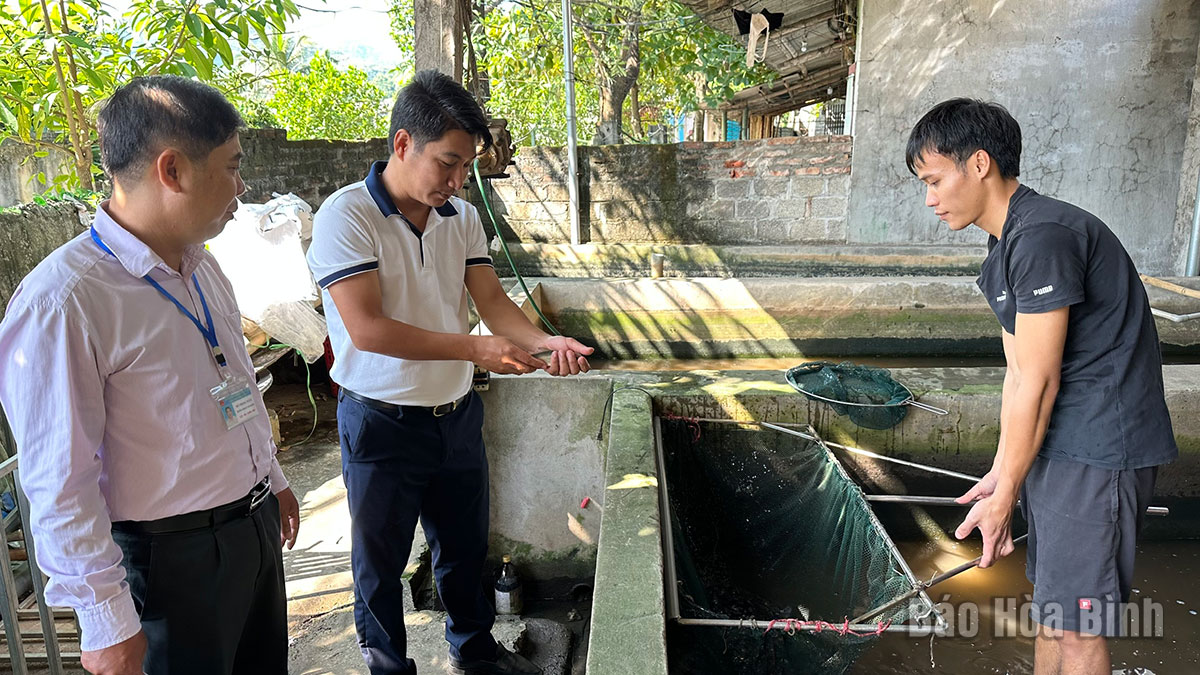
(HBO) – With a quite large system of rivers and lakes and Hoa Binh hydropower reservoir, Hoa Binh province has potential and strengths for aquaculture exploitation and production.
Staff from the fishery sub-department check the quality
of fries before supplying them to the market.
Caged fish farming in the Hoa Binh hydropower reservoir has been developing for
years. Now, there are about 4,940 fish cages in the reservoir, and most of the cased-fish
farms have applied advanced technology, mesh cages, and iron frames. Production
scale gradually shifted from small to larger concentrated production with
advantageous products. The private economic sector deeply participates in
aquaculture production, helping to boost high-quality caged-fish farming.
Therefore, the province's aquatic products in general and Da
river shrimp and fish in particular have strongly expanded to markets outside
the province, especially gradually gaining a foothold in the Hanoi market.
However, reality shows that the proportion of production value
of the fisheries industry in the Hoa Binh reservoir area is not commensurate
with its potential and strengths. Not many fish varieties with high
productivity, quality, and economic value are put into production. The form,
scale, and scope of cooperation in aquaculture do not meet the requirements of
commodity production and are unsustainable. Few businesses have poured large
investments into aquaculture.
Currently, Hoa Binh province aims to develop farming of high-value aquatic
species, focusing on raising caged- fish on large reservoirs for processing and
export.
Accordingly, the province has directed the authorities to study
and find varieties with high economic value, and build a model of raising fish
fingerlings in cages to proactively supply sufficient fingerlings.
The province targets to apply clean and sustainable aquaculture
technology and promote linkage from fries production, farming, processing, and
marketing. It is strictly prohibited to use chemicals that negatively impact
the environment. Agencies must strictly inspect and monitor environmental
developments, promptly warn of disease risks and provide fish farmers with
market information so that they can choose suitable species to raise.
The provincial People's Committee issued a directive document on strengthening
food safety management in aquaculture and trading for domestic consumption and
export.
The committee assigned specific tasks to departments, agencies,
and People's Committees of districts and cities to ensure the quality and food
safety of local agricultural products.
Particularly, the Department of Agriculture and Rural
Development was requested to direct affiliated units to strictly manage the
issuance of food safety certificates to establishments.
The department was asked to coordinate with departments,
agencies and People's Committees of districts and cities to organise programmes
to promote specific agricultural, forestry and fishery products of the province
in domestic and international markets.
For organisations and individuals cultivating and trading
aquatic products, the provincial People's Committee requires them to apply
technical, scientific and technological measures in aquaculture. They are not
allowed to use banned chemicals and antibiotics. They are urged to regularly
upgrade and renovate facilities to improve product quality and packaging
designs to meet consumer tastes.
Producers and traders are urged to actively participate in
domestic and foreign trade promotion programmes to find partners, especially in
foreign markets. They are advised to keep updating technical barriers and
regulations on the quality and food safety of aquatic products of the importing
country to avoid violations, economic losses as well and loss negative impacts
on the local products’ reputation.
The Hoa Binh provincial People's Committee held its monthly meeting on March 26 to review the progress of key projects, assess budget revenue and public investment disbursement, provide feedback on draft documents for submission to the provincial Party Committee's Standing Board, and discuss other important matters related to the committee's governance activities.
Playing a key role in Hoa Binh province’s economic development, Luong Son district has been focusing on science and technology development, innovation, and digital transformation.
Identifying the application of online public services as a key step in administrative procedure reform and e-government building, Kim Boi district has proactively provided services and supported residents and businesses in accessing and utilising full-process online public services promptly and efficiently. The locality aims to lift the rate of end-to-end online public services to over 90%, with all officials and civil servants handling tasks in the digital environment.
Nguyen Anh Tuyet, hailing from a family steeped in the ancient art of herbal medicine, is transforming local medicinal herbs into high-value concentrated extracts, elevating their worth and healing potential.
Nguyen Phi Long, an alternate member of the Party Central Committee, Secretary of the Hoa Binh provincial Party Committee, and head of the steering committee for the province's key projects, chaired a conference on March 25 to discuss measures for implementing the project on constructing the Hoa Lac - Hoa Binh road and upgrading the Xuan Mai - Hoa Binh section of National Highway 6 under the public-private partnership (PPP) model.
Administrative reform has been identified as a key priority in enhancing state governance, improving the business environment, and facilitating services for citizens and enterprises.



